When we think what will make our Christmas really amazing this year, I’m sure all of us have some ideas . . .
- A phone call from that family member we haven’t heard from in a while.
- Santa bringing us something that we actually like.
- An oven that magically bakes the best bread for Christmas morning—though we aren’t really good cooks at all.
Or, in my case no flight delays on Christmas morning . . .
It’s true: we come to this time of year with lots of expectations.
We want Christmas Eve to be magical full of light and love.
We want Christmas morning to be charged with feelings of peace on earth and no more cyber terrorism.
And if we are a parent, we want the days between Christmas and New Years’ to go by really fast so school starts soon . . .
But have we ever thought about Christmas as the day when nothing went as planned and God’s greatest blessings were completely unexpected?
This is the familiar story that we know: Mary has just gotten the word from the angel Gabriel that she is to bear a son, from the Holy Spirit whose name will be called Jesus.
Beautiful words to start a story, right? But, let’s think about it all from Mary’s perspective. What happened to Mary was nothing she ever planned.
It wasn’t as if Mary came from a life situation where having a child so young, some scholars believe she was as young as 14, was a welcomed joy.
It wasn’t as if Mary was born into royalty where she received a health care plan at Herod’s expense.
It wasn’t as if she had access to the best midwife care in her town.
It wasn’t as if Mary’s very life wasn’t at risk for bearing a child, no matter if this child was the son of God or not.
And, from the information scripture does not give us, we can assume this too: Mary did not come from a supportive family situation.
Never do we hear of her mother, or her father. Or, anyone for that matter that is coming to her aid.
One preacher friend of mine puts it like this: “What Mary does not have is sonogram, or a husband, or an affidavit from the Holy Spirit that says, ‘the child is really mine, now leave this poor girl alone.’ No teen pregnancy organization surrounding her with support.”
So, where was God in such a bewildering time like this? How on earth was she going to get through this especially as her body was changing more and more every day?
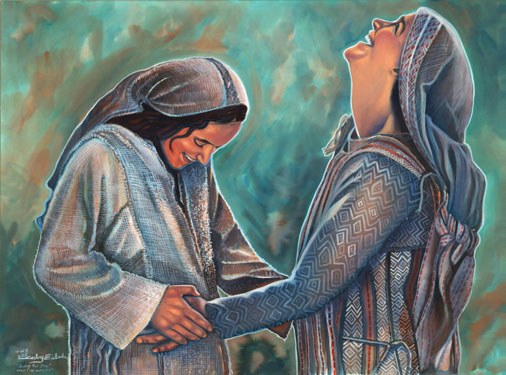 Enter into the picture, Mary’s older cousin, Elizabeth.
Enter into the picture, Mary’s older cousin, Elizabeth.
Another unexpected thing happens in this family---
Elizabeth, at an unknown age way past childbearing years, has found herself pregnant too. Though thinking for years that she was barren and thus, looked upon in society as second class beyond her already lower status state, a child comes to her womb too.
Her son will be named John and will be given the responsibility to prepare the way for the Christ.
So when Mary had the idea of setting out to see her cousin Elizabeth, it was an important meeting for them both. These two—together—might just have some insight into what this crazy God they worshiped was all about.
Then as soon as Mary greeted Elizabeth, Elizabeth’s child is recorded as “leaping in her womb.” It was a prophetic sign that even in spite of the confusion swirling around both of their lives something greater than both of them was occurring. God was very close.
And for the next three months, these two unlikely prophets and prophetic children they are carrying, come to see how their state of being can be considered a blessing.
Rev. Barbara Brown Taylor writes about what occurs with Mary’s state of mind as a result of being with Elizabeth: with her “the young girl doesn’t have to explain her situation to Elizabeth or ask her questions in search of answers, even to ask for acceptance.
When Mary sees her older cousin, Taylor imagines, she sees a ‘gorgeous’ woman, not gorgeous by ordinary standards, you understand, but so full of life that is hard to see beyond her joy.”
The unexpected thing that happens from the moment Mary walked into Elizabeth and Zachariah’s house is that Elizabeth became for Mary the mother figure or spiritual mentor that she needed to re-frame the story of all that was happening to her.
And so as the baby Jesus leaps in Mary’s womb, it is Elizabeth who speaks blessing over Mary’s life in a way that she could only have really heard from her: “Blessed are you among women, and blessed is the fruit of your womb.”
Elizabeth re-narrates this thing that has happened to her cousin in a way she could understand it to be the goodness of God coming to her. Elizabeth gives Mary language to understand this blessing so she can praise God for it!
And through Elizabeth’s loving care, Mary would begin to see that what was happening to her not as “that day that ruined my life” or “some unfortunate circumstances” but a blessing!
I love Elizabeth for this reason—and believe we all need more Elizabeth's in our life (no pun intended!)
But it’s important to say here that as Mary gained this new supportive friend, noting about the hardship of her situations really change (or Elizabeth’s for that matter).
A lot of hard stuff was next! Mary needed to tell Joseph some unwanted news. Soon she would have to endure the stares at the marketplace (everybody wondering, who is Mary’s baby daddy?). And Mary would still have to meet the sharp pains of childbirth in ancient Palestine without much help.
But she would not be alone. Elizabeth would be with her in spirit. God’s son would be growing in her belly.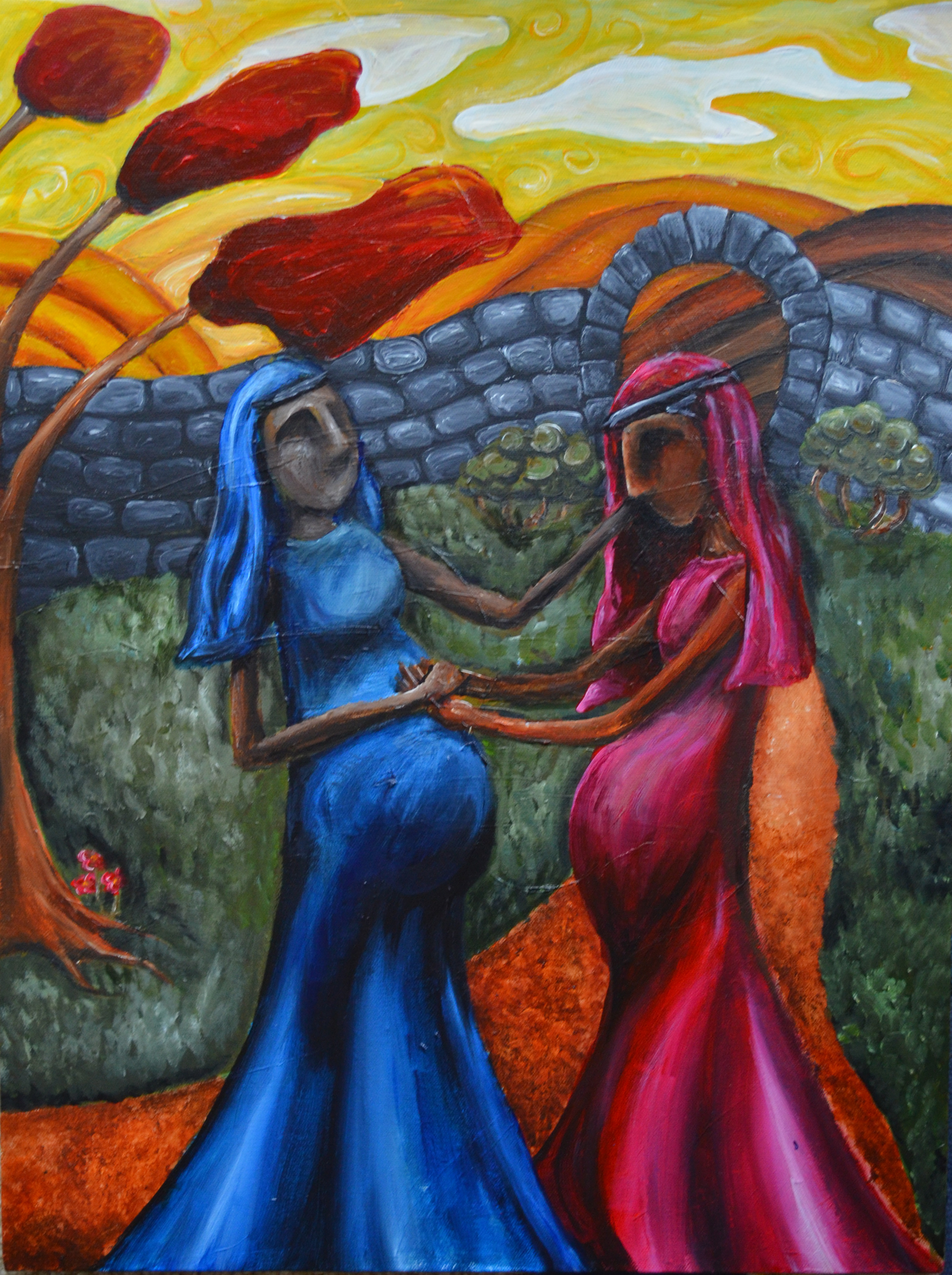
And even thought Mary may not have understood why God choose her, there was a lot to sing about.
That afternoon at Elizabeth’s house, Mary was the unlikely soloist in God’s choir (who knows if she could even carry a tune) but she sings: “My soul magnifies the Lord, and my spirit rejoices in God my Savior . . .. Surely, from now on all generations will call me blessed; for the Mighty One has done great things for me, and holy is his name.”
But, Mary could have been angry.
She could have been overtaken by fear.
She could have protested to God—this is not how the first Christmas should be! I don’t want this part in the play!
But she doesn’t.
She makes the choice to receive the unexpected. She welcomes God into her very being.
Maybe not in the way that history always tells her story—passive full of blind submission, but I believe with maturity that could have only came from sticking close to dear ones like Elizabeth and to her own spiritual instincts.
And as Mary sings about how God “has looked with favor on the lowliness of his servant” she is embodied this new direction of God’s song for all people!
For in God choosing her a peasant girl, God is saying loud a clear, the economic and social tables of this world will soon be turned upside down. A new world order is coming in the kingdom of God that Mary’s child will preach and proclaim. Everything will change!
The most unexpected blessing of all would be that the fruit of her womb, Jesus, would soon bless ALL people of the earth. You and I would not be sitting here today if Mary had not received God’s unexpected gift.
And isn’t it true? God’s unexpected gifts are always better than we could imagine!
So I ask you again, what are you expecting this Christmas?
Anon, a leader of the Islamic faith recorded this prayer about the coming of blessings:
I asked for wisdom...
And God gave me problems to solve.
I asked for prosperity...
And God gave me brains and the strength to work.
I asked for courage...
And God gave me danger to overcome.
I asked for love...
And God gave me troubled people to help.
I asked for favors...
And God gave me opportunities.
I received nothing I wanted.
I received everything I needed.
My Prayer has been answered.
I shared this prayer because I have seen it come true time and time again in my life.
How often have I set out on a life path thinking, I know exactly how the story is all going to end, only to land somewhere different? But ultimately is better if I’m walking in the ways of the Spirit?
Just think for a moment where in life you were on this day—December 21st or hereabouts last year?
What were you consumed with? What were you worried about? What were you spending most of your time on?
I think about my own life—last Christmas, sort of sad. I was thinking about how much I had to say but no place to say it. But now, I am having so much at The Federated Church.
If we take just a moment to gain some big picture perspective, what we’ll find is that God is doing unexpected things in our lives all the time. He’s making crooked paths straight. He’s leading us into new relationships. He’s opening doors where life’s cruelties have shut windows.
But the question for us is—how are we responding?
Are we blocking the movement of the Holy in our lives by being consumed in things that really don’t matter much in the end?
Are we blocking the moment of the Holy by refuses to see what are the best choices for our life’s routines?
Are we blocking the movement of the Holy by our own stubbornness to believe this unexpected story of redemption?
 Today, my friends let us take some encouragement from Mary. Let us follow in her footsteps and make the choice to believe. Knowing that as we do, an Elizabeth is on her way—whoever she may be—to inspire us for all that lies ahead.
Today, my friends let us take some encouragement from Mary. Let us follow in her footsteps and make the choice to believe. Knowing that as we do, an Elizabeth is on her way—whoever she may be—to inspire us for all that lies ahead.
Let us not let one more moment pass in this busy time of year where we don’t make room in our hearts for more peace, more hope, more joy and more love.
Why?
Because tis the season for Christ to be born and we need to get ready!
“Oh come my heart, Lord, Jesus, there is room my heart for you.”
AMEN
I travel a lot these days to hug children, to greet staff and to write stories about how Feed the Children’s donors are helping kids have clean water, access to education and more sustainable food sources around the world. Sometimes, I wake up not knowing where I am! But when I figure it out, I want to full present in that space, not somewhere else.
I'm back in United States this week, settling in, remembering, and telling others about my 3 week experience in Tanzania and Kenya. Trying to heed my own advice about being present here now . . .it is hard to do.
I keep thinking about Kenya. There are few words that can describe what happened. It was more profound that just seeing the life-changing work. It was more profound that having my eyes opened to deeper levels of poverty I'd ever seen. It was more profound than entering into the deep waters of relationship with my Kenyan friends and even more profound than being asked to baptize four of the children who are a part of our children's center in Nairobi.
No, this trip gave me a gift that only God could give.
The best words I have come from my songwriting friend, Sara Groves.
Something changed inside me broke wide open all spilled out
Till I had no doubt that something changed
Never would have believed it till I felt it in my own heart
In the deepest part the healing cameSomething so amazing in a heart so dark and dim
When a wall falls down and the light comes inAnd I cannot make it
And I cannot fake it
And I can't afford it
But it's mine
Something changed.
And if you wanted to see for yourself, let me introduce to two some mothers I met while visiting a Feed the Children water project in Samburu, Kenya. And I should tell you we could not speak a word of an understandable language to one another.




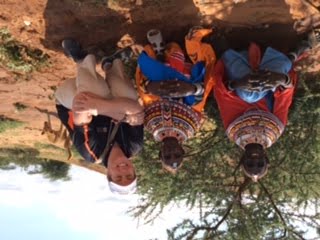
Mary is 36 weeks pregnant, and baby Jesus is due any day.
How do we learn to wait for a baby savior?
Waiting for Christmas is about waiting for a baby to be born, and as any mom will tell you, that kind of waiting is hard work. We get impatient. We get distracted. We take baby waiting as primarily an excuse to eat huge quantities of butter, chocolate, and combinations of the two. But babies change everything, and learning to wait with hopeful longing for God’s new life to burst into the world is at the heart of the Christian faith.
But not everyone who waits for babies waits 40-week gestational periods. There are some parents who must endure rounds and rounds of infertility tests and treatments to even have the possibility hearing that a baby is officially on the way. There are some parents who wait by wading through the rigors of adoption paperwork and court dates. There are some parents who wait for babies who doctors have said have little chance of survival out of utero. There are some co-waiters: aunts and uncles, grandparents, and siblings who come alongside those who wait for babies, both when there is a due date and also when there is not.
What can all of these experiences of waiting teach us about waiting for baby Jesus?
 We (Sarah and Elizabeth) became friends as roommates at Duke Divinity School. We later were both ordained as ministers within the Baptist church. Several years after seminary, I (Sarah) birthed two girls back-to-back and wrote a theological reflection about the experience in a book called, Creating with God. I (Elizabeth) am still waiting to become an official mother, and have written a book (forthcoming) about infertility. How could we as pastors and friends hold our radically different experiences of waiting in the same conversation? This writing project is our answer.
We (Sarah and Elizabeth) became friends as roommates at Duke Divinity School. We later were both ordained as ministers within the Baptist church. Several years after seminary, I (Sarah) birthed two girls back-to-back and wrote a theological reflection about the experience in a book called, Creating with God. I (Elizabeth) am still waiting to become an official mother, and have written a book (forthcoming) about infertility. How could we as pastors and friends hold our radically different experiences of waiting in the same conversation? This writing project is our answer.
This Advent season, we invite you to learn to wait for a baby Savior by waiting with us.
We have asked 4 people with radically different experiences of waiting for babies from even us to write one meditation for each of the four weeks of Advent: Joe, Susan, Beth, and Dayna. We hope that over the course of Advent you get to know each of us better and enter into our stories in a deeper way. We’ve also asked guest writers to join their voices to our project too: Joy, Chris, Jonathan, Jennifer, Kevin, Ed and MaryAnn. They’ve got some fabulous things to say too!
Join us in this conversation of study and preparation this Advent. If you would like a PDF of the project emailed to you, leave your email in the comments or sent a message in the "Contact" section of the blog and we'll be glad to send you the daily devotions.
With anticipation,
Sarah and Elizabeth
If you want to read some posts- check out these favorite ones from some of our writers posted in Advent 2013:
“Discovering Joy” Dayna Olson-Getty (a grieving mom’s story about finding peace)
“Discovering Joy” Elizabeth Hagan (a grieving mom to be)
“Discovering Joy” Susan Smartt Cook (a midwife’s perspective on waiting)
“Love That Groans” Beth Dotson (a grandmother who has waited with others)
“Love That Groans” Joy Bennett (a grieving mother who lost a child)
“Waiting with Hope” Jonathan Wilson-Hartgrove (an adoptive dad)
“Waiting with Hope” Sarah Jobe (a mom of 2 young girls)
Jambo (hello) from Kenya.
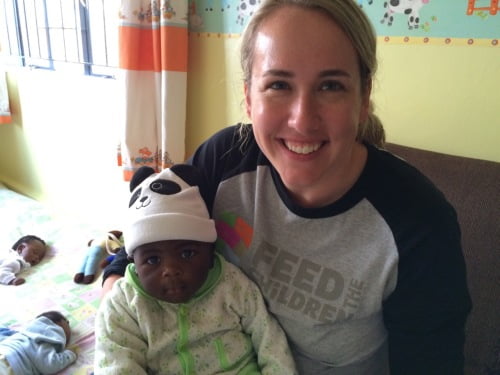 For the past two weeks, I've found myself traveling in East Africa to participate in the work of Feed the Children.
For the past two weeks, I've found myself traveling in East Africa to participate in the work of Feed the Children.
I've taken early morning flights. I've brushed my teeth with bottled water. I've visited primary schools. I've watched the sun set over the Indian Ocean. I've taken lots of pictures for FEED's social media. I've helped to cook Thanksgiving dinner for 50 kids. I've sorted Christmas presents. I've eaten more chips (french fries) than I should. I've held babies, lots of them.
In all of these things, I'm learning.
I'm learning about the importance of traveling with lots of vitamin C, good shoes and your own plane blanket.
I'm learning about having throw-up cloths near by at all times when holding babies, and never to underestimate the power of showing a child a picture of his or her face (what joy!).
I'm learning that slowing down is the way of life in Tanzania and good tea is everything you dream it to be and more in Kenya.
It's my 6th trip to the region since 1999. My East African country list includes Kenya, Malawi, Tanzania, Uganda and Rwanda as well as having flown through Ethiopia on multiple occasions. This region feels more and more part of my life every time I visit. In fact, the Feed the Children staff now greet me when I arrive, "Welcome home!"
I'm learning that when an African says, karibu (welcome) they really do mean it and want you to feel a part of their lives and space. 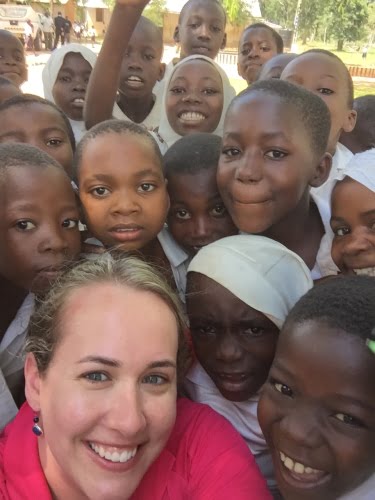
I'm learning the sweetness of friendship is so very possible here, even if there were so many reasons to be disconnected.
But even more than this, this preacher on the plaza is learning about my faith, the faith that I want to have in Jesus.
Coming to Africa reminds me that the Jesus I think I know isn't wrapped up in my American citizenship. Jesus always crosses racial and language divides. Jesus always leads us to the stories of the most vulnerable and ignored. And then asks us do something about what we hear!
Most of all I am learning to not be surprised when Africa opens my heart, like no other place on earth can.
To new friends.
To eyes that tell stories.
To shocking possibilities.
To hope.
One of my favorite authors, Anne Lamott says this: “Hope begins in the dark, the stubborn hope that if you just show up and try to do the right thing, the dawn will come. You wait and watch and work: you don't give up.”
There's so much I'm hoping for here.
For more children to be well-fed.
For nations and their leaders to be at peace.
For my own heart to live into what has eternal value.
Africa: what a classroom!
I'm so glad I'm here.
A Sermon about Exodus 17:1-7 preached at The Federated Church, Weatherford, OK
 Do you remember the last time you were really thirsty? Parched mouth? Dry tongue? Dreaming of water flowing from a faucet?
Do you remember the last time you were really thirsty? Parched mouth? Dry tongue? Dreaming of water flowing from a faucet?
In our water bottle, water fountain and Sonic on every corner culture, it’s unheard of that any of us would ever "die of thirst” as we are all known to dramatically say from time to time.
Water is something we have enough of, almost always in this part of the world. Unless, of course, a tornado threatens to come through or an ice storm hits and our neighbors hoard the bottles of water off the shelves at Wal-Mart leaving nothing for the rest of us . . .
In Old Testament reading for this morning, Israelites found themselves with one very big problem and it had everything to do with water.
Two weeks ago, we left the Israelites on the their journey out of Egypt as the miracle of the crossing of the Red Sea just happened. With joyous celebration they exclaimed the amazing provisions of their LORD leading them on their way into the Promise Land!
Just three days after crossing the Red Sea-- the big and dramatic-- experience of faith, the group was short on water. Scripture tells us that God led them to a spring where their thirst could be quenched. All was well. God was mightily at work among them, providing for their every need.
But, of course we know that their water jugs did not stay filled for long.
In chapter 17 verse 2 they said to Moses again: "Give us water to drink."
And, such was a good, normal, everyday, essential need, right? Of course they had a right to ask this request of God.
H2O, we know, is critical to our very existence: the definition of a need. Most medical professionals will say that a human being, in reasonable to good health can only live between 3-5 days without water before suffering from extreme dehydration and shock leading to death.
So, while, we might read Exodus 17 with thoughts in our head like "here they go again complaining,” simply the Israelites sought to express a deep need. They needed to say to Moses, their spiritual and administrative leader, "We must have water now!"
In the meantime, however, what were they to do? How were they to wait?
How were they to respond to an unmet need that they were powerless to fix?
Did it mean that their need was not really a need?
Did it mean that God had abandoned them and truly wanted them to die, as they feared? It sure felt that way . . .
It's easy to kick the dog when you are down right? And, so, went the days of the lives of the Israelites and their relationship to Moses.
As they perceived God not giving them the life they wanted, they took out their pain on the easiest next best thing: Moses.
Voicing their frustration to the point that we hear Moses fearing for his life in verse 4-- believing that in their extreme thirst the crowd might stone him if they didn't get a drink and fast.
Moses' natural response to the crisis as a leader was fearful of the crowd's response, but tempered. We hear in the words of this text, Moses saying to the crowds: simmer down stop bothering me and simply trust in God’s provisions-- as this was God's job to meet their needs.
I can imagine, if I were a member of the crowd, I would have found Moses' calm as a cucumber leadership style really annoying. Wouldn’t you?
Trust that God would provide?
"Oh, Moses," I would have said. "It's so much harder than that. When, tell me, when God is going to get God's act together and find us some water!”
For, secretly they hoped that in Moses' bag of superpower, bring on the 10 plagues kind of tricks, he could lead them by another spring and they'd worry about water no more. But, such was just not going to happen.
They needed to wait. They needed to wait to see what could become.
A friend of mine shared with me this week a similar frustration with the world and with God.
After being out of work for the past nine months due to a company downsizing in these difficult economic times, she is currently at the end of her rope.
After sending out over 500 resumes, doing everything she can to do what experts say to do when you are looking for work: networking, staying on a schedule everyday and trying not to get down on herself even as the funds in the bank account slowly begin to run down, she says the best parts of her life are dying more every day.
After interview after interview, rejection letter after rejection letter, and sleepless nights and pleas for prayer to any religiously minded person she knows, my friend shared she was beginning to think that God had forgotten her.
No one in her life seemed to care that she was out of work and without a job coming her way soon; she might lose everything she's worked so hard for including her modest home. She hears her pastor say often at church that “God is going to work things out” but to her God is a distant figure that doesn’t seem to care about her pain.
But in the spirit of these same frustrations, the Israelites were asked to have ACTIVE faith in their waiting.
They were asked to believe that God was still at work, even if they couldn’t recognize it in the moment.
And so, these were Moses' instructions from God: "Go on ahead of the people, and take some of the elders of Israel with you; take in your hand the staff with which you struck the Nile and go. . . . Strike the rock,” God said, "and water will come out of it."
It was a simple as that. Strike the rock with your staff.
I can imagine that laughter erupted from the crowd AND anxiety of what might be next (if this didn't work) from Moses. This God they were serving was just getting crazier and crazier all the time . . .
But, Moses did as instructed by the LORD. And to the amazement of all, it worked. Sweet God Almighty brought them water from a big ole rock!
Let’s stop here and note that this provision was nothing like they expected. NOTHING. But yet it was water nonetheless and EXACTLY what they needed.
 The water came not from a spring (as it did before) nor from going back to Egypt (as they had suggested), rather, it came from something that was dead.
The water came not from a spring (as it did before) nor from going back to Egypt (as they had suggested), rather, it came from something that was dead.
Though it would have not been a word they used at the time, the best way I know how to describe the scene is by calling it resurrection! That out of something that seemed life-less and certainly not life-giving, out flowed streaming of living water.
Professor Amy Erickson sums up what happens in this way: "It strikes me (pun intended!) that God choose to bring water-- and the life it symbolizes and will impart-- out of something that appears to be lifeless . . ."
But, this my friends is exactly how God works.
Dead is never dead in the kingdom of God.
Lost causes are never really lost.
And the broken down and washed out are really never without hope.
When I was serving as an associate pastor at Untied Methodist congregation while in seminary at Duke Divinity in North Carolina, I told it was my job to make most of the pastoral visits.
On a Monday afternoon only a couple of months into my second year at the church, I found myself sitting in a rocking chair on the back porch of Mrs. Melba’s house. She offered me some iced tea—as good southern women do. We began chatting about life. She wanted to know how my classes were going.
Mrs. Melba, a spunky woman in her early 70s, tried to keep a brave face for this young pastor student. But soon she was fighting back tears as she began to recount to me details about her husband’s recent death. He’d died of cancer recently.
She misses him more than she could even say.
She had trouble, she said, finding the energy to get out of bed in the mornings, many days still.
She couldn’t seem to find her purpose for living life anymore, she told me.
I remember this afternoon so well because in the moments that followed, I broke what I had learned only a few days earlier in class, some of the “rules” of pastoral care. My classmates and I were told to not show too much of our own emotions when we made visits. But, I cried too. Melba and I sat and rocked on that porch and cried. Her feelings of this great “dead end” sign life had handed her felt just as overwhelming to me. Sadness felt thick in the air.
Because most of all Melba felt like God had forgotten her. Everything around her felt dead. She felt dead without her beloved, even though her pulse told her she was still living.
A few years later, a man in mid 30s sat in my office. We were chatting about life. How crazy the amount of snow that winter had been.
But soon, Tom began telling me about how he felt his life had hit a dead-end too.
Tom was the father of three kids, but none of them were living with him at the time. His ex-wife had sued him for full custody of the kids, and had won because of the hot-shot lawyer she’d hired.
Lies had been told about him court.
Though Tom had made some mistakes in life—been a big fan of drinking too much in his younger years—he’d cleaned up his act and there was no good reason why he couldn’t even see his kids on the weekends.
To make matters worse, at a church Tom had previously attended, he was told by an associate pastor that he was no longer welcome to worship at the Sunday services. The pastor, it seemed was the reason his marriage broke up in the first place. His wife and the pastor had a long-term relationship on the side that he was just now finding out about.
Tom felt let God was as far away as possible. Everything around him felt dead too. No wife, no kids, and no church family to help him through this hard time in life.
But—and there is always a BUT in the kingdom of GOD—these feelings of deep despair was not the end for Melba and Tom.
Though in these moments they faced some of their darkest hours, God was still at work.
New water was about to come out of rocks in their lives.
As Melba continued to put one foot in front of the other, getting out of bed every morning, slowly she began to see that life wasn’t finished with her.
Through the loving embrace and watchful care of her church family, she started moving toward service of others once again. Melba started singing in the choir. She involved herself in the mission projects of United Methodist Women and she took her turn leading the lessons in her Sunday School class—using the lessons she learned about finding God in this hard place with other widows like herself.
And Tom, as he took the risk of being a part of a new church community, putting aside the hurt of his previous church in the past, began to see new life spring up around him too.
Tom’s secret passion for writing became a real gift to the church’s communication ministry.
And with encouragement from some new friends and the recommendation of a new lawyer, he was able after 5 long years of separation to spend weekends with his kids again.
.jpeg) Both Melba and Tom learned through their pain that this exactly how God works. Dead is never dead in the kingdom of God. Lost causes are never really lost. And the broken down and washed out are really never without hope.
Both Melba and Tom learned through their pain that this exactly how God works. Dead is never dead in the kingdom of God. Lost causes are never really lost. And the broken down and washed out are really never without hope.
So, my friends, I tell you today, the God of Israel, the God of Moses who struck that rock that day to watch water flow from such a dead place is alive and wanting to be at work in your life too.
Let us be active in our waiting.
Let us not grow weary in doing good.
And let us surround ourselves with loving community to remind us of the Lord’s goodness if we forget.
And in fact, this is what we are about to celebrate in a few minutes as we come to the table of God—we’ll taste and see that what was once dead has come to new life. We’ll taste and see the sweetness of resurrection called the body and blood of our Lord. And we’ll celebrate together that anything, yes, anything is possible in the kingdom of God. God is always at work!
AMEN
God Sent Me Before You: Genesis 45:1-15
Sermon Preached at Idlywood Presbyterian Church, Falls Church, VA
It is so easy look out on the world with a lens of two categories in which to place people: heroes and villains. Maybe this is indeed why the movies with the highest gross sales this summer (or anytime of the year usually) are those films about superheroes using their  powers to defeat the evil characters. We can’t get enough of depictions of do-gooders vs. villains it seems. Batman vs. the Joker. Spiderman vs. the Green Goblin. And of course, Superman vs. Doomsday. It’s an expression of this to:
powers to defeat the evil characters. We can’t get enough of depictions of do-gooders vs. villains it seems. Batman vs. the Joker. Spiderman vs. the Green Goblin. And of course, Superman vs. Doomsday. It’s an expression of this to:
- Label one group as right and another as wrong and to have no grey in the middle... .
- Label one neighbor as good and another as bad without hope of rehabilitation . . . .
- Label everything in life in fact according to the statement of “either you are for me or against me.”
And in doing so, our depiction of what it means to be human in this world becomes quite flat, doesn’t it? All the complexity, all the compassion, all the grace simply isn’t present.
Even if we call ourselves opened minded or even progressive Christians, we have to admit we all like to play this game of assigning parts both to ourselves and those we encounter in our daily lives . . . And of course, you and I always play the role of “good guys.”
This morning I am going to propose that when we read scripture, we do the exact same thing. We read Biblical stories assuming we’d find alignment with only the best of the best. And if not this, then we’d find ourselves in the group of the characters that emerge in the end as heroes. Right?
We’d be like Jonah preaching to Ninevah. We’d be like Stephen, preaching the gospel until our death. We’d be like Paul going on his 3rd missionary journey bringing hundreds to the faith. But, wow.
What a distorted image we have of what doing good in this world is all about! And of God's word too.
So this morning, I’m inviting you to take a deep breath. To take a 15 minute and counting holy pause and open our eyes anew. And in this time, see again the limitation of what is our human lens but what is the vastness of our God.
In our Old Testament reading for this morning we encounter Joseph, several chapters into this story as outlined with careful detail in the book of Genesis. This is what we know—and probably what many of you might know well from Sunday School or a certain Broadway play called Joseph and the Amazing TechniColored DreamCoat.
Joseph was one of the younger sons of the great patriarch of the Hebrew story, Jacob. Joseph was born to Rachel, Jacob’s favorite wife along with the youngest Benjamin. And for this reason and others that only Jacob knows—Joseph was a highly favored child. And everyone knew it, including his 11 other brothers. In his favored status, Joseph became the kind of guy that all of us might just want to slap around for his “know it all” attitude.
So you can imagine how well this went over with his brothers . . .
One day Joseph came and spoke to them about a dream he had (that one day they would bow down to him) ALL while wearing the special coat that father gave to him and only him. In response, Joseph had to die, one brother said! And the prank that should have just been a boyish prank went one step too far.
Joseph was thrown into a pit. And he was left there. In an effort to get rid of him, a brother sold him into slavery to a band of travelers that just so happened to be heading toward Egypt.
That night Joseph’s father, Jacob was told that his beloved son was dead.
Joseph goes on to Egypt in chains. He makes the best of it though, becoming a house slave for prominent Egyptian citizen. But his good luck didn’t last for long. Soon he was accused of adultery (that we clearly see he didn’t commit) and thrown into Pharaoh’s prison.
It’s at this point of the story that we start to feel sorry for Joseph. Poor guy was not loved by his brothers. Poor guy was thrown into a pit. Poor guy was sold as a slave. Poor guy found himself in prison. Joseph, clearly is the good guy, then, right? Poor Joseph.
And while I’m all for compassion to those who have suffered--- after a week like what we’ve had this week, we know our world is in need of more compassion and kindness, isn’t it?
But, let us stop ourselves from making this story into good guy moralism tale—as if Joseph had no responsibility (even a little) for what happened to him that day his brothers threw him into a pit.
The story goes on that Joseph rises up from a prison inmate to become Pharaoh’s advisor, again by relying again on his dream interpretation ability. He tells Pharaoh that he sees that a famine is coming to the land. In the days of plenty, Egypt needed to prepare for the lean times that would be up ahead.
The Pharaoh trusts the counsel of Joseph’s dreams so that when the famine does come—just as Joseph said it would be—Egypt has already positioned itself as a nation of great influence. Everybody who needs grains has to make a journey to Egypt to purchase some.
And as the story goes, the sons of Jacob are hungry—they are running out of food and Jacob sends them to Egypt to purchase some food. But, Rachel’s other son, Benjamin cannot come. He must stay at home with his father in case anything happens to the band of brothers along the way.
So the brothers come to Egypt. They make their case. They tell their story. Joseph knows right away who these men are, but the brothers do not know Joseph. It is at this point of the story where most would say that Joseph had every right to take revenge, to make his brothers pay for how his life was ruined as we’ve heard shouts of “somebody’s going to pay for this” all week on the news.
And this is what we know, Joseph doesn’t cause them harm. But he doesn’t openly embrace them either. Instead Joseph plays a game.
Anyone watch the popular reality TV show called, “Undercover Boss?” It’s found its way to cable television now though it used to be shown weekly on CBS. The basic premise is that a prominent CEO goes undercover in various positions throughout the company for a week.  In doing so, the CEO usually puts on a wig or special costume, tells no one whom he or she is with hopes of finding out the real story of what is going on with the morale of the lower level employees.
In doing so, the CEO usually puts on a wig or special costume, tells no one whom he or she is with hopes of finding out the real story of what is going on with the morale of the lower level employees.
It can be funny at times as a person used to wearing a business suit every day is ordered by their trainers to wash dishes or hang power lines or even collect trash—all while no one knows that the "trainee" is really the ultimate boss. The show usually climaxes in a reveal moment—where everyone knows the truth about the big boss. Those who have done a good job while in the presence of the CEO unaware are rewarded and those who have misbehaved are disciplined.
When we arrive at Genesis 44, what we find is Joseph acting a lot like the CEO of “Undercover Boss”—he gives his brothers a series of tests to see how they will respond. He places a large amount of money in several of their bags—as a test of honesty.
He throws his brothers into prison until they can come back with his youngest brother and then later his father.
As I was sitting with these verses this week, trying to come to the conclusion that most commentators do at this point: “Oh, Joseph was just trying to be sure his brothers could be trusted…. Of course he’d put them to the test.” I just couldn’t go there, because what I saw Joseph doing was playing tricks on his brothers, torturing them with his games.
Why? Because he was doing what those who have been abused often do to others—abusing them in return.
Joseph helped his brothers feel some of the pain he’d known for all those years. And sure, while it would have been nice if Joseph’s brothers had enough awareness to recognize him in the first place . . .
And sure while it would have been nice for his brothers on first sighting of Joseph, bow down in tears of repentance . . .
They didn’t. But, such did not give Joseph a free pass at playing hurtful games on his brothers.
To be abused does not give a person the right to be an abuser. Ever.
Eventually, much like the ending of one of the Undercover Boss shows—Joseph could not control himself anymore. Upon sight of his full-blood brother, Benjamin he weeps then collects himself again then declares to all: “I am Joseph.”
And Joseph makes this statement in chapter 45, verse 5: “And now do not be distressed, or angry with yourselves, because you sold me here; for God sent me before you to preserve life.”
It is at this moment, church that we want to bless Joseph as the good guy, the one who pulled himself up by his bootstraps, the hero of providence that used the circumstances handed to him for good—and all of this true. Joseph is a good man as much as any of us are good. Joseph did seek to do well with the difficult life challenges he was given. And he certainly was a guy who could be labeled with the virtue of “perseverance.”
BUT, is this a story about Joseph and what it means to be on the good guys team? Many Biblical commentators might say yes, as they often want to turn this chapter into a role-play about “how to make friends with your enemies.”
But consider Joseph’s statement again—“For God sent me before you. . . .” I believe that one sentence is the best thing Joseph ever said or did. Joseph may have gotten a lot wrong and he might not be a perfect model on reconciliation, BUT he stopped to acknowledge the Lord. And by saying, “God sent me before you,”
Joseph gives a short sermon summing up what could be the entire message of scripture.
Let me explain: you see, in the end, the story wasn’t really about Joseph. It wasn’t about his brothers or his father. It wasn’t even about the continuation of the tribe of Jacob and their sticky relationship to come with the nation of Egypt.
No, Joseph’s life is a story about God. It’s story was and is about how God includes us, uses us and cares for us as we live into the good news of life’s grey in between.
It’s a story about how nothing of our humanness can hinder the movement of God’s presence in the world—not our pride, not our deceit, not our trickery, nor our famines or war.
It’s a story about how God is such a mystery beyond all our comprehension—even on the darkest of nights, most confusing of landing points, we can still believe in God who goes ahead of us to forge a way. It’s a story of God being very much present. When I look at our world and all the big things that have happened in the past week or two-
- Cease fires not honored in Israel and Gaza
- Children starving in Syria
- Beloved comedians taking their own lives
- Innocent black teenagers being shot in Ferguson, MO
(And more than I can name)
I have to think that all of us need some more good news of a God who goes before us, a God who never leaves us (though we might feel the absence), and a God who uses even the greatest evil plots of human hands for the good.
Later on in chapter 50 Joseph says this to his brothers, “You meant [what you did] for harm, but God meant it for good.” Why the horror of corruption, of evil, of injustice go on in this world, I do not know.
Why God does not intervene sooner than we would like, I do not know.
But what I do know is this: good always wins in the end.
And, God’s vision for our lives, for this world, for the human race is always bigger than we could ever imagine. So we need not go back to our search for a superhero, or our camps of “He’s good and she’s not.”
No, let us find another way to be together that begins in love.
And though weeping may come for the night, joy will come in the morning.  Would you join me in singing this song of hope as our reminder of God’s presence with us?
Would you join me in singing this song of hope as our reminder of God’s presence with us?
He´s got the whole world in His hands, He´s got the whole world in His hands, He´s got the whole world in His hands.
He´s got the the tiny little baby in His hands, He´s got the the tiny little baby in His hands, He´s got the whole world in His hands.
He's got ev'rybody here in His hands. He's got ev'rybody here in His hands. He's got the whole world in His hands.
AMEN
“All In”
Sermon Preached at Oaklands Presbyterian Church in Laurel, MD
Matthew 13:31-33, 44-52
 I don’t know about you but I’m not the kind of person who enjoys taking BIG risks.
I don’t know about you but I’m not the kind of person who enjoys taking BIG risks.
I like to make measured decisions with the risks carefully analyzed and put into a larger perspective. I’m the kind of person who likes to shop the sale rack for the best prices and then comes back with a coupon for a discount 2 days later—with a spring in my step because I know I’ve made a really good decision.
In light of this, I’ve always thought that gambling with money was stupid because of odds.
But on a recent stop through Las Vegas while on vacation with my husband, Kevin, I found myself sitting in front of a slot machine, something I've only done a few times in my life.
And not just any slot machine, a DOLLY PARTON slot machine that sang to me “Working 9 to 5” and “Jolene” anytime I put coins in. I know it’s not a preacher-ly thing to do—starting off the sermon talking about gambling . . . but hang with me.
Within minutes, I found I’d doubled my $20 bill with Dolly singing my praises with another round of “Jolene.”
It was exciting but I was ready to stop. My husband—the biggest Dolly Parton fan—egged me on though.
“Don’t you just want to keep playing?? You’re hot! Why don’t you bet it all? I think you’ve got Preacher’s luck!”
But, I said no. I just wanted to leave the game and the entire experience while I was ahead. Proud of the fact that I was doing what few do: leaving Vegas with more money (if only a few dollars) than I started with.
Sure, I could have made more money, but I could have lost more money just as easily!
Though I don’t think that the parables before us this morning really have anything to say about gambling as we know it in our modern context, they do challenge our sentiments toward risk management and playing it safe. The scriptures before us today ask us questions like:
Why do we NOT make impulsive decisions when the Spirit moves us to act?
Why do we NOT stay in the game longer, even if we can't be assured that we'd win?
Why do we NOT make so- called “unwise” investments when a neighbor is in need?
For what we see before us is teacher Jesus telling stories about what it looks like when the kingdom of God comes near.
Look with me at verse 44.
“The kingdom of heaven is like a treasure hidden in a field, which someone found and hid; then in his joy he goes and sells all that he has buy that field.”
We don’t know much about this featured person, and Biblical commentators warn us from supposing an extra detail or even focusing on the morality of a man or woman hiding a treasure in a field that is his or hers to have.
But what we do know is this: there’s nothing that holds him or her back from selling EVERYTHING owned so that the treasure buried in the field can be obtained.
Can you imagine how crazy this must have sounded to friends and family?
“Well there’s this treasure that I need to have so I am going to sell everything so I can have it!”
No more house. No more land. No more well. No more bed. No more, anything else other than this field.
Such is the kind of purchase that we might deem worthy of a psych evaluation, wouldn’t we?
Look with me at verse 45.
“The kingdom of heaven is like a merchant in search of fine pearls; on finding one pearl of great value, he went and sold all that he had and bought it.”
It’s important to understand here that at this time, pearls were the jewel of choice. Not diamonds, not rubies or any other precious object. In the first century Mediterranean world, the pearl was often the symbol of the highest good.
And, for this person to find one fine pearl, ONE, and sell everything that he had to purchase it was an unheard of!
Imagine how crazy this man would have sounded in his Christmas letter to family and friends:
“Well, this year’s highlights include becoming homeless so that I could purchase this fine pearl.”
Again, such is the kind of purchase that we might deem worthy of a psych evaluation, wouldn’t we?
We just don’t do things like this in the civilized world do we?
But according to Jesus, we do. This is what the kingdom of heaven is all about.
I want to pause a minute and consider what is meant by the phrase “kingdom of heaven.” As an aside, the terms “kingdom of heaven” and “kingdom of God are often used interchangeably in the gospels.
In the church I grew up in—the Southern Baptist Church— a phrase like “kingdom of heaven” or “kingdom of God” would have always implied one thing: the life hereafter. In Sunday School, we would have interpreted the two parables we just re-read as passages that shared a message to us about what it means to “win souls for the Lord.” I could just hear echoes from my past saying things like, “How could we put a price on salvation of one person? Wouldn’t we sell everything we owned if it meant that just ONE more child of God would get to heaven one day?”
But, as I have grown both in my faith and the tools given to interpret scripture, I’ve come to realize that the “kingdom of heaven” is not explicitly about the life to come, but rather a way of being in this world that brings more of the love of God to it.
The kingdom of heaven, in short, is Jesus’ way of pointing to the Spirit filled world, a world without limits of race, nationality or tongue, a world where righteousness always wins and truth is brought forth to life.
The kingdom of heaven, as Jesus says in other parts of Matthew’s Gospel IS NOT far away, out there for someone else or about the holy waiting on their reward. The kingdom of heaven IS possible in the here and now, everyday life.
Theologian Frederick Buechner says this about the kingdom of heaven,
“If we only had eyes to see and ears to hear and wits to understand, we would know that the Kingdom is in the sense of holiness, goodness, beauty is as close as breathing and is crying out to be born both within ourselves and within the world; we would know that the Kingdom of God is what all of us hunger for above all other things even when we don’t know its name or realize that it’s what we’re starving to death for . . . The Kingdom of God is where we belong. It is home, and whether we realize it or not, I think we are all homesick for it.”
And it is just for this that we are ALL asked to be ALL in for. No matter the cost.
In the earlier part of the reading in verse 31, Jesus put before them another parable which said:
“The kingdom of heaven is like a mustard seed that someone took and sowed in his field. It is the smallest of the seeds, but when it is has grown, it is the greatest of shrubs and becomes a tree, so that the birds of the air come and make nests in its branches.”
If you have been around church people for any length of time, you’ve probably heard the phrase: have faith like a mustard seed.
Folks are often to quote the words of Jesus saying, “If you have faith like that of a mustard seed, you can move mountains.” And/or put this verse of scripture on magnets, coffee mugs and mustard seed chains to wear around their neck.
And it is true, just as Matthew 13 says that the mustard seed is small and our contributions to the kingdom don’t have to be large and overbearing to be important. What I think is even more significant than this is: mustard bushes are stout. They never grow as tall as an oak or a pine tree. But when they grow, they spread across a field quickly. And out of nowhere they are EVERYWHERE.
A similar plant that we might be more aware of is kudzu. Growing up my grandparents had kudzu in their yard. My grandmother hated it but every time she’d send my grandfather out to the garden to get rid of it, it would just come back and come back and come back. So annoying.
 In the same way, once you’ve got a mustard tree, you’ve got all you can handle and then some.
In the same way, once you’ve got a mustard tree, you’ve got all you can handle and then some.
And in the kingdom of God, though our radical living might come in deceivingly small and seemingly insignificant ways, our presence in the world will be like an unstoppable weed. We cannot be controlled. The powers of evil of this world can do nothing to stop us. The kingdom of God comes. Period.
But first we have to be all in. We need to make that choice to give ourselves over to kingdom living. To say to the Holy, I am going to follow your leadings. Period.
Pastor Kyle Childress writes on this blog of how he has come to see this principle lived out in his congregation:
Kyle says: I have a woman at my church who has Multiple Sclerosis. Since I’ve known her she has declined from a very active life, involved in a variety of concerns including backpacking and camping, to a person who is in a wheelchair and some days can’t get out of the house.
But every single day she writes letters and notes and cards. Every day. She writes our congressman urging him to work for peace or to care for God’s good creation or to show compassion for the least of these.
Every day she sends birthday cards to members of the congregation and every single day she sends prayer cards telling people who are ill or suffering of her prayers for them.
Every day, day after day.
Never relenting, never giving up.
No one blows trumpets or shoots fireworks when she slowly, sometimes painfully writes her notes and cards and most of the time no one knows about it at all unless you’re the person on the receiving end of her correspondence.
But like the mustard bush she persists. Like a mesquite root under a sidewalk, one day the sidewalk cracks. Our congressman has no idea what he’s up against.
And the same is true for us when we too are all in . . . whatever all in looks like in our lives.
Maybe it’s like my friend who's almost blind who bakes bread every single week for communion at her church and can’t wait to present it to her rector.
Maybe it’s like my friend who knits blankets for newborns born premature, taking them to the NICU of her local hospital as often as she can. Then sticking around to rock the babies who moms are at work.
Maybe it’s like my friend who regularly welcomes those who are recently released from prison into her home without any questions asked until they are able to get back on their feet again.
In all of this, the unjust powers of this world better start shaking in their boots for when the kingdom comes and our "mustard seeds" are planted, the duplication of God’s love is about to roll across our highways, our fields, our schools, our workplaces, and our government offices.
Nothing is ever the same once you’ve experienced the coming of God’s kingdom.
This is what I most know:
We can’t play it safe my friends and live in the kingdom of God.
We can’t hold back part of ourselves my friends and bring the kingdom of God.
We can’t not lay ALL bets on the table my friends and expect more of the kingdom of God to come.
We’ve got to be all in.
It’s what the kingdom of heaven is like.
AMEN
Life.
It is always happening.
Sometimes it's great. Other times it is not.
 And today I am wondering about existing when things aren't well.
And today I am wondering about existing when things aren't well.
How do you go on when we are very aware that life’s broken edges cracked parts of you that might never be repaired?
How do you keep breathing when everything in you wants to lay down in surrender to what is lost?
How you have hope when life is never full of any guarantees?
Such are questions I’ve been thinking about a lot lately both for myself and those in whom I love that are experiencing suffering.
Getting out of bed. Putting on pants. Cooking at home. Making hopeful plans. Going to the gym. Calling a friend. Laughing when something is funny.
This is what not so well seasons of life are all about.
Making space for Grace to surprise.
Accepting conversation and loving embrace.
Appreciating the kindness, even small gestures.
Walking in the sunshine.
Bathing slowly.
Remembering the breath of life that is and has always been within.
When it is time to pray again, it will come.
When it is time to walk on a new path, it will be revealed.
When it is time to create, it will flow.
But when all is not well, it is good to accept it. It is good to surround yourself with people who don’t mind your crying. It is good to drink hot tea and pour a glass of wine later. It is good to wear fuzzy pajamas.
One day, Grace will help you move on. One day.
Until then, you know that there you are. Breathing in and breathing out.
Jesus said: “Peace I leave with you; my peace I give to you. I do not give to you as the world gives. Do not let your hearts be troubled, and do not be afraid.” John 14: 27
I have waited with many who are waiting to have children. Often this path is not full of peace.
My daughter found the pathway to peace to be a difficult one. As they were thinking about a second child after having the first one through an IVF procedure, she asked, “Am I being selfish in pursuing this a second time? Am I trying to play God?”
God gave her peace when God spoke to her heart that in whatever direction they took, God was still in control, and that her desire to pursue God’s will was enough. They had a second child, a beautiful boy.
After this IVF procedure they froze two embryos, so having a third procedure was not a hard decision for them. They were open to having more children. But, then they miscarried.
My daughter found herself asking, “Why?” Finally, realizing that her question would most likely not be answered, she asked God to give her peace with the two sons He had given to her. She says that “there came a day when God revealed to me that these two were all I needed, and I was okay. Since then, I have realized that I need to simply pursue God more than pursuing anything else, and that is enough.”
Peace, as the world defines it, comes when life is in the order you want it to be -- enough money, the right family, the right place to live, on and on, and so peace, when it seems to come, is only fleeting and shallow because life is always changing. The world’s peace does not last.
But as I see it, the “the peace of God that transcends all understanding” can only come from knowing that we are secure in our Father’s hands, that God knows what God is doing with our lives even when we don’t have a clue, and that loving us and transforming us into looking like Jesus IS Jesus’ way. “Glory to God in the highest, and on earth peace to humankind on whom His favor rests,” the angels say to the shepherds.
With my daughter, like so many of us who are waiting this Advent, peace is something we learn.
When life is exploding around me, I have to purpose to remember that God loves me and peace will come as I receive. When I am covered up in insecurity and fear, I am to remember that I am God’s treasured possession and that God will not let go of me and peace will come. When I am degrading myself, I need to learn to receive His words over me that I am the “apple of His eye” and peace will come.
One who is learning God’s peace doesn’t have an anaesthetized look, where she is bleary eyed or in denial of the rigor of life, but one who can have a holy boldness to go on (even when she is shaking within), knowing that “our momentary troubles are achieving for us an eternal glory that far outweighs them all. So we fix our eyes not on what is seen, but on what is unseen. For what is seen is temporary, but what is unseen is eternal.” (2 Corinthians 4: 17, 18 NIV) In essence, peace comes through relationship.
Israel only had peace from staying in relationship with Almighty God. When they strayed from the relationship, war came, captivity came, and darkness invaded their souls. Ironically, Jesus came during the time of “Pax Romana,” a forced military peace imposed by the Roman Empire, but their forced peace only rendered moral decay, confusion, and frantic searching. Jesus came and brought the peace that the world could not give, the peace that comes only through being in a vital and vibrant relationship with Him. When the angel came to Mary and told her she would become pregnant through the Holy Spirit, she said, “How can this be?” When told, “Nothing is impossible with God,” she proclaimed, “I am the LORD’s servant. May it be to me as you have said.” God’s peace gave her the strength to be the mother of the Son of God!
Our exhortation is to be like Mary saying, “May it be to me as You have said, LORD?” and as we do, as we obey, as we seek relationship with Him, peace will come.
Let us pray:
I want to stay focused on You, Jesus, not on all of those things that deprive me of the peace that You have to give to me. Jesus, show me again and again that You are enough, and that in You, “SHALOM” will come. Amen.
 Beth Dotson resides with her husband Danny of 42 years in Signal Mountain, TN. She is Presbyterian and is presently working in a ministry that serves HIV clients. She loves her family dearly, has five grandchildren, plays in the outdoors in all kinds of capacities with her husband and their black lab, Zeke. Her desire for her advent is that we would wake up to its wonder and how that wonder translates into the miracle of the mundane in our lives.
Beth Dotson resides with her husband Danny of 42 years in Signal Mountain, TN. She is Presbyterian and is presently working in a ministry that serves HIV clients. She loves her family dearly, has five grandchildren, plays in the outdoors in all kinds of capacities with her husband and their black lab, Zeke. Her desire for her advent is that we would wake up to its wonder and how that wonder translates into the miracle of the mundane in our lives.
“Therefore, since through God’s mercy we have this ministry, we do not lose heart.” II Corinthians 4:1
I have been in labor for almost five years.
There have been ultrasounds.
There has been blood work.
There has been pain: both physical and emotional.
I feel called to motherhood. It’s as strong as the calling I felt to enter the pastorate ten years ago. It’s as strong as the calling that I felt to marry over six years ago. But, I am still a childless mother. My bio below lists no children in our immediate family.
When I first began the journey toward motherhood, I was naïve.
After being married a year, I thought we’d start trying to have kids and then nine months later pop out a beautiful baby. I saw so many of my friends become mothers so easily. My mind and body felt strong. I saw no groaning up ahead. Why would childbirth not happen easily for me?
I had no idea the process of waiting for a baby can extend Advent after Advent, year after year.
I had no idea that labor pains sometimes can feel like the awkwardness of attending a party and being asked by a stranger “Why don’t you have children?” It’s finding your way to a polite response, though what you really want to say is “bug off.”
I had no idea that labor pains can feel like a dear friend telling you she’s pregnant with her third. It’s finding a way to say with a smile and a hug, “Congratulations!” You are happy for her, but . . .
I had no idea that I’d have to invite doctors and lawyers and friends into the process—a process that should have been all about love between my husband and me but instead became a process that included contracts, test tubes, and diagrams of the fertilization process between an egg and a sperm.
Through this painful waiting, I’ve asked God a few questions:
Where are you God when what seemed so sure fell through again?
Where are you God when I had to preach about a teenaged girl having a baby again?
Where are you when my college girlfriends gather to talk about their babies, and I have nothing to offer again?
Throughout this journey of motherhood I’ve always had a choice.
I’ve had a choice to believe that God has clothed me in the scarlet letter of infertility (and God hasn’t).
I’ve had a choice to believe that this wait is punishment for some un-confessed wrongdoing (I don’t believe it is).
I’ve had a choice to believe that I will never welcome children into our family (I still believe we will).
At this juncture of the journey I choose to believe that the desires of my heart will come to fulfillment, somehow, someway. As I continue to wait, I’ve been given the opportunity to experience God’s love at a deeper level than I ever could have imagined. Friends blessed me with deep expressions of kindness that have healed parts of me that I didn’t know were so broken. My husband and I have leaped into the certainty of “No matter what, we are going to get through this together.” And my faith has come to the other side of knowing for sure that even as this season of waiting labors on, my waiting is not in vain. God’s kingdom is coming though it is not already here.
Like Paul told the believers in Corinth, “we have this great ministry, we don’t lose heart,” God has reminded me of this time and time again. And it has been love that has carried me through this labor—love of what my heart has seen, though my eyes have not. In God’s kingdom, we groan together and wait.
Let us pray:

God, Advent can be such a hard time for those of us who are in the middle of waiting for what is to come. Help us to find your love for us even in the midst of the pains of labor that endure for the night. We pray together for your light to come. Amen.
Elizabeth is an ordained minister in the Baptist tradition, a freelance writer and a social media consultant who divides her time between Arlington, VA and Oklahoma City, OK with her husband Kevin. She blogs regularly at “Preacher on the Plaza” (this site). This Advent Elizabeth is hoping for the gift of being present in the moment.
There's been a lot of talk the past couple of weeks about the Philippines, hasn't there? From the devastating earthquake a few weeks ago to this past weekend's destructive typhoon, it seems that the people of these islands are not getting a break. They've faced so many trials. It's been almost too much to watch!
As I've caught up on the news and heard reports from the Feed The Children staff in the Philippines (many who have lost everything in one of these major events!), my mind has quickly gone back to the experience I shared in this country almost exactly a year ago last year.
 On our first Feed The Children trip to Asia, Kevin and I explored several islands with the staff (as seen to the right). We meet community members involved in Feed The Children's programs. And as we toured, I couldn't help but feel schooled on the fact that the perceptions I had on what "aid" looked like were all wrong.
On our first Feed The Children trip to Asia, Kevin and I explored several islands with the staff (as seen to the right). We meet community members involved in Feed The Children's programs. And as we toured, I couldn't help but feel schooled on the fact that the perceptions I had on what "aid" looked like were all wrong.
On November 5th, I blogged this:
As I write this I find myself on a boat heading from Bohol back to Cebu (Philippines) . . . We just met a group of families on a remote island who pulled their resources together to begin a village savings and loan– where their was no bank to help give the financial resources to move the community forward.
During our visit, our delegation was allowed to observe, a shareholders meeting, a weekly occurrence, where loans were given and dividends were paid back to share holders. We learned that 10% of the money made in the project goes back to assist the children in the community. Parents said, “We want a better life for kids. We know that begins with us being good stewards of our own resources. We want to be able to do this ourselves.” Over the past year this community (where it is not commonplace to have toilets in the house or more than one pair of shoes per person) has saved over $3,500 US to reinvest in their children’s school. . . .
For now, this is what I know: most of the world is not as it seems to us from our lens of American privilege. The “have-nots” people are not less than human. Change CAN happen as resources and strong leadership are given to make it possible.
For me, I am learning that life can no longer be about “that trip” or “out there” but somehow we must find a way to integrate life in such a way that all of life is about being a member of the human family that is full of challenges, yes, but hope. We must do what we can to serve wherever we find ourselves. We must never think our privilege as an honor, but an opportunity to be in a larger community.
I've thought about these reflections again recently, especially as so many organizations are on the ground now in the Philippines seeking to help those in need.
I think it's wonderful when the world comes to the aid of the vulnerable. Some crises are indeed so bad that we need help that must come from those with more resources than we have. And the commercial in me would like to tell you to give (if you feel so compelled) to Feed The Children.
But what bothers me about the news coverage and talk of the Philippines these days is it is so easily turned into an "us vs. them" appeal.
Because what is true is this: the people of the Philippines are strong. They are resilient. They will take care of each other with whatever resources they've got. And if we choose to help them (and I hope we all will), it is good to give from the perspective of these are my brothers and sisters in need NOT those poor and sad people out there.
We've got teachers who embody saving, sharing and giving all over the world. And many of those are found in the Philippines. It's our job not only to share but to learn.
Some school children in Edmond, Oklahoma wrote these notes to be put in a disaster relief box given out by Feed The Children this week. Words to live by:
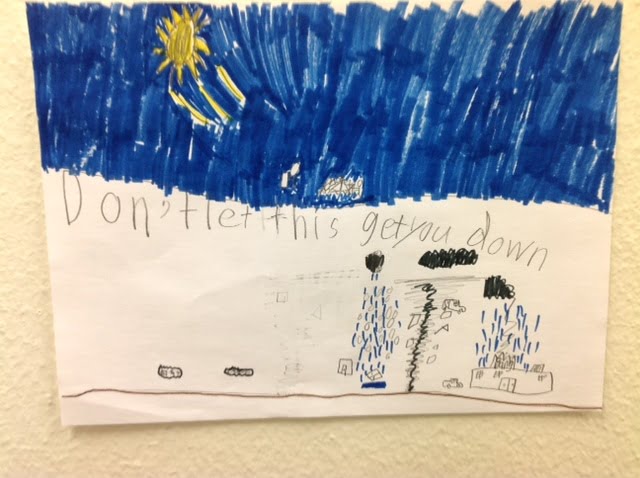
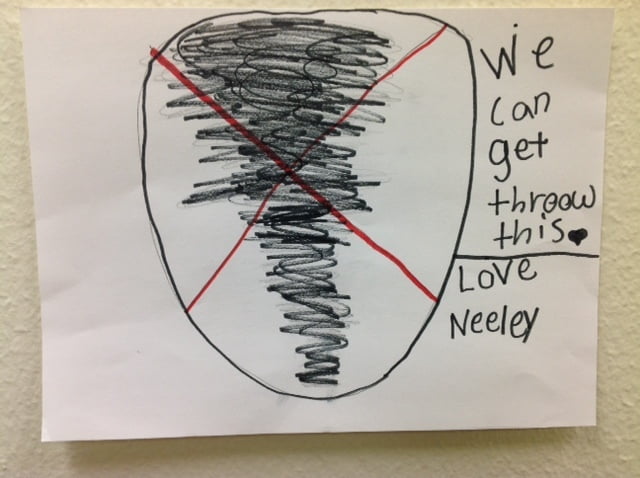
We (Sarah and Elizabeth) became friends as roommates at Duke Divinity School. We later were both ordained as ministers within the Baptist church. Several years after seminary, I (Sarah) birthed two girls back-to-back and wrote a theological reflection about the experience in a book called, Creating with God. I (Elizabeth) am still waiting to become an official mother, and have written a book (forthcoming) about infertility. How could we as pastors and friends hold our radically different experiences of waiting in the same conversation? This writing project is our answer.

 Enter into the picture, Mary’s older cousin, Elizabeth.
Enter into the picture, Mary’s older cousin, Elizabeth.
 Today, my friends let us take some encouragement from Mary. Let us follow in her footsteps and make the choice to believe. Knowing that as we do, an Elizabeth is on her way—whoever she may be—to inspire us for all that lies ahead.
Today, my friends let us take some encouragement from Mary. Let us follow in her footsteps and make the choice to believe. Knowing that as we do, an Elizabeth is on her way—whoever she may be—to inspire us for all that lies ahead.




 For the past two weeks, I've found myself traveling in East Africa to participate in the work of
For the past two weeks, I've found myself traveling in East Africa to participate in the work of 
 Do you remember the last time you were really thirsty? Parched mouth? Dry tongue? Dreaming of water flowing from a faucet?
Do you remember the last time you were really thirsty? Parched mouth? Dry tongue? Dreaming of water flowing from a faucet? The water came not from a spring (as it did before) nor from going back to Egypt (as they had suggested), rather, it came from something that was dead.
The water came not from a spring (as it did before) nor from going back to Egypt (as they had suggested), rather, it came from something that was dead..jpeg) Both Melba and Tom learned through their pain that this exactly how God works. Dead is never dead in the kingdom of God. Lost causes are never really lost. And the broken down and washed out are really never without hope.
Both Melba and Tom learned through their pain that this exactly how God works. Dead is never dead in the kingdom of God. Lost causes are never really lost. And the broken down and washed out are really never without hope. powers to defeat the evil characters. We can’t get enough of depictions of do-gooders vs. villains it seems. Batman vs. the Joker. Spiderman vs. the Green Goblin. And of course, Superman vs. Doomsday. It’s an expression of this to:
powers to defeat the evil characters. We can’t get enough of depictions of do-gooders vs. villains it seems. Batman vs. the Joker. Spiderman vs. the Green Goblin. And of course, Superman vs. Doomsday. It’s an expression of this to: In doing so, the CEO usually puts on a wig or special costume, tells no one whom he or she is with hopes of finding out the real story of what is going on with the morale of the lower level employees.
In doing so, the CEO usually puts on a wig or special costume, tells no one whom he or she is with hopes of finding out the real story of what is going on with the morale of the lower level employees. Would you join me in singing this song of hope as our reminder of God’s presence with us?
Would you join me in singing this song of hope as our reminder of God’s presence with us? I don’t know about you but I’m not the kind of person who enjoys taking BIG risks.
I don’t know about you but I’m not the kind of person who enjoys taking BIG risks. In the same way, once you’ve got a mustard tree, you’ve got all you can handle and then some.
In the same way, once you’ve got a mustard tree, you’ve got all you can handle and then some. And today I am wondering about existing when things aren't well.
And today I am wondering about existing when things aren't well.
